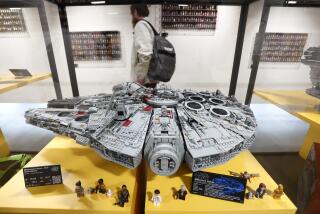People and Events
- Share via
Welcome home, sailor--now take a hike.
Like the 1,603 other guys aboard the battleship Missouri who returned to Long Beach this week from the Persian Gulf, gunner’s mate Michael Spence got a hero’s welcome.
Then he got the bum’s rush.
Before he shipped out last summer, he parked his 1981 blue Dodge Omni in a Navy “forces afloat” parking lot.
But last fall, the lot was resurfaced, and his car--with his golf clubs and friends’ camera and diving gear inside--was apparently ordered towed off.
The tow company, following state law, said it tried to notify Spence but couldn’t. (Spence says his parents, whose address he uses, never got any notice.)
So the car--again as prescribed by law, the tow company said--was eventually sold to an auto dismantler for $150.
“We were at the pier, it was wonderful, the hugging and everything,” said Angela Morin, whose son is Spence’s friend and shipmate. But when Spence fished his well-traveled car keys out of his pocket, “he says, ‘I can’t find my car.’ We thought he was joking,” Morin said.
“It really is a letdown . . . I feel as if I’ve been robbed,” said Spence, who will soon finish up his three-year Navy stint and had planned to start driving home to Ohio this week.
Navy spokesmen could not be reached for comment Friday.
But Ed Wiener, manager of City Tow, said, “It’s unfortunate and everybody feels bad, but the system just takes over and it keeps going.”
First it was hot currency. Now it’s cold cash.
When U.S. Customs inspectors wondered why a Sears microwave oven was being shipped from Los Angeles International Airport to Colombia in 1986, they looked closer--and found about $100,000 inside, money destined for drug buys.
As happens with some confiscated goods, customs officials eventually sent the guilty microwave to their Riverside office. But when they plugged it in, it didn’t work.
Enter Martin Hull, then a Sears appliance repairman. He unscrewed the top and “I dropped the cover back down because I couldn’t believe it. Then I picked it up again, and it was still there.”
“It” was $73,000--$20s, $50s and $100s wrapped in rubber bands.
“We found the money in the oven; we didn’t find the money that was in the lining,” said Pacific regional customs spokesman John Miller.
Hull turned in the money, and on Friday, Hull--now a manufacturing engineer for a Los Angeles company--got something back: $5,000, the first money the Los Angeles customs office has awarded in a program encouraging the reporting of international drug transactions.
“We’d like to give away more of this,” Miller said.
The world’s most expensive microwave is back in the customs office, where the heat is on.
Fur, free.
Victims of cat burglars who made a bizarre trade of smashing car windows to steal stuffed Garfield-the-cat toys will have their filched felines replaced.
Dakin Inc., which makes the fat-cat figures that cling to car windows with suction-cup paws, will re-supply the comic-strip creature free.
At least 40 thefts have been reported locally, in what police suppose must be a frat hazing ritual or adolescent gag.
Bereft owners must send copies of accident reports to the Brisbane, Calif., company, spokeswoman Cathy Sotir said.
“We can’t fix their windows, but at least we’ll be able to replace the ‘Garfield Stuck On You.’ ”
If you thought you weren’t seeing things, you were right.
This week’s scouring winds meant that Los Angeles’ nights were just a bit darker than usual.
Not that the breezes blow away the kilowattage; it’s just that wind chases out the clouds and gunk that usually hover and bounce the city’s lights back, illuminating the ground.
“I’m sure it’s been measured,” said John Mosley, program supervisor at Griffith Observatory. “When you have clouds, it’s much brighter than when it’s clear, because of the reflection.”
More to Read
Sign up for The Wild
We’ll help you find the best places to hike, bike and run, as well as the perfect silent spots for meditation and yoga.
You may occasionally receive promotional content from the Los Angeles Times.







